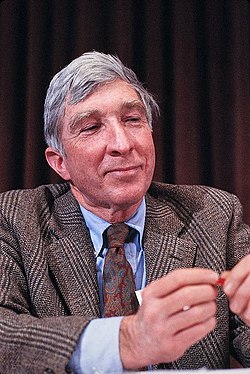John Updike Quote
He accelerates. The growing complexity of lights threatens him. He is being drawn into Philadelphia. He hates Philadelphia. Dirtiest city in the world, they live on poisoned water, you can taste the chemicals. He wants to go south, down, down the map into orange groves and smoking rivers and barefoot women. It seems simple enough, drive all night through the dawn through the morning through the noon park on a beach take off your shoes and fall asleep by the Gulf of Mexico. Wake up with the stars above perfectly spaced in perfect health. But he is going east, the worst direction, into unhealth, soot, and stink, a smothering hole where you can’t move without killing somebody. Yet the highway sucks him on, and a sign says POTTSTOWN 2. He almost brakes. But then he thinks.
He accelerates. The growing complexity of lights threatens him. He is being drawn into Philadelphia. He hates Philadelphia. Dirtiest city in the world, they live on poisoned water, you can taste the chemicals. He wants to go south, down, down the map into orange groves and smoking rivers and barefoot women. It seems simple enough, drive all night through the dawn through the morning through the noon park on a beach take off your shoes and fall asleep by the Gulf of Mexico. Wake up with the stars above perfectly spaced in perfect health. But he is going east, the worst direction, into unhealth, soot, and stink, a smothering hole where you can’t move without killing somebody. Yet the highway sucks him on, and a sign says POTTSTOWN 2. He almost brakes. But then he thinks.
Related Quotes
About John Updike
Hundreds of his stories, reviews, and poems appeared in The New Yorker starting in 1954. He also wrote regularly for The New York Review of Books. His most famous work is his "Rabbit" series (the novels Rabbit, Run; Rabbit Redux; Rabbit Is Rich; Rabbit at Rest; and the novella Rabbit Remembered), which chronicles the life of the middle-class everyman Harry "Rabbit" Angstrom over the course of several decades, from young adulthood to death. Both Rabbit Is Rich (1981) and Rabbit at Rest (1990) were awarded the Pulitzer Prize.
Describing his subject as "the American small town, Protestant middle class", critics recognized his careful craftsmanship, his unique prose style, and his prolific output – a book a year on average. Updike populated his fiction with characters who "frequently experience personal turmoil and must respond to crises relating to religion, family obligations, and marital infidelity".
His fiction is distinguished by its attention to the concerns, passions, and suffering of average Americans, its emphasis on Christian theology, and its preoccupation with sexuality and sensual detail. His work has attracted significant critical attention and praise, and he is widely considered one of the great American writers of his time. Updike's highly distinctive prose style features a rich, unusual, sometimes arcane vocabulary as conveyed through the eyes of "a wry, intelligent authorial voice that describes the physical world extravagantly while remaining squarely in the realist tradition". He described his style as an attempt "to give the mundane its beautiful due".
